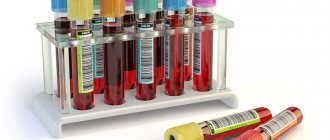Why do you need vitamin B9?
Very often, folic acid is prescribed to women who are preparing to become mothers. Its intake begins 3 months before conceiving a child, since acid does not accumulate well in a woman’s body and is excreted in the urine, and therefore must be taken in advance. Vitamin B9 plays a huge role in the formation of the fetal neural tube. Also, this vitamin subsequently contributes to the formation and normal growth of all future tissues and organs. Therefore, it is very important for the expectant mother and her child. The usual dosage during this period is from 400 to 800 mcg per day.
Normal indicators and deviations
In order to correctly interpret the results of a blood test, it should be taken into account that reference values in different laboratories may differ. This is due to the use of different reagents. Using the most common research method, the folacin content ranges from 3 to 18 ng/ml.
Only a specialist can correctly interpret the results of the analysis, since the analysis is not a specific marker for identifying a specific disease. Therefore, you should not try to diagnose yourself, even if your folacin level is too high or too low.
Low level
If the level of folacin is low, then the reason may be an insufficient intake of the substance from food or malabsorption. A deficiency of folacin in the body may be due to:
- an incorrectly formulated diet (for example, a passion for protein nutrition that is fashionable today);
- anorexia;
- excessive addiction to alcohol.
A decrease in folacin levels may be due to physiological reasons, that is, increased consumption of the vitamin. This is noted:
- during pregnancy and breastfeeding;
- in adolescence, during the period of growth;
- in old age.
Vitamin loss can also be caused by diseases:
- sepsis, fever;
- hyperthyroidism;
- dysfunction of the liver, kidneys;
- oncological diseases.
Malabsorption is usually caused by intestinal diseases or taking medications that interfere with the absorption of folacin.
Advice! Drugs that interfere with the absorption of vitamin B9 include aspirin, Biseptol, antibiotics and other drugs.
Increased level
If the analysis shows an increase in the level of folacin, this may be due to:
- lack of animal products in the diet;
- improper intake of vitamin preparations;
- intestinal diseases.
So, folic acid is a substance, the deficiency of which disrupts normal physiological processes in the body. But if the norm of folacin content is significantly exceeded, then this condition is no less dangerous. To determine the content of the substance in the blood, a special test is prescribed.
Benefits of folic acid
There is no need to think that this drug should be used only by expectant mothers; it is also useful for other women. Its beneficial properties are:
- In enhancing immunity.
- It is a prophylactic against viral diseases.
- Reduces the risk of heart disease.
- Helps reduce the occurrence of migraines.
- Reduces the risk of cancer.
- Helps with stomach problems.
- Increases the body's resistance to stress.
This product has a positive effect on facial skin and helps reduce the number of age spots. This acid is also useful for nails; thanks to its content in the blood, nails are less likely to flake and break. Helps strengthen the hair follicle, causing hair to fall out less and not split, and it also gets extra shine. In cases where a woman does not intend to become a mother, the daily norm of folic acid in the blood is 0.2 mg.
Normal values
Normally, the concentration of vitamin B9 in the blood ranges from 7 to 39.7 nmol/l. These values may vary slightly depending on the reagents and equipment used in a particular laboratory. Therefore, the obtained indicators should be compared with the data indicated in the “reference values” column on the results form. According to WHO recommendations, the daily requirement for vitamin B9 in children in the first year of life is 50 mcg, from 1 year to 3 years - 70 mcg, from 4 to 6 years - 100 mcg, from 6 to 10 years - 150 mcg, from 11 years – 200 mcg. During breastfeeding, it increases to 260 mcg, during pregnancy - to 300-400 mcg, and in some cases (for medical reasons) - to 800 mcg. A physiological decrease in the amount of folate may be associated with frequent consumption of strong tea, which accelerates the excretion of the vitamin, or alcoholic beverages, which reduce its absorption in the intestines and activity in the blood.
Excess vitamin B9
Although it is primarily a water-soluble vitamin and is excreted from a woman's body in urine, it can still accumulate and cause harm. Its level can be higher than normal only if the drug has been taken for a very long time and not as prescribed by a specialist. Also, the indicator may be higher due to the fact that a woman takes various vitamins that contain this acid, and it does not have time to be excreted. Elevated levels of B9 in the blood can lead to stomach upset or anemia. Also, high levels of this vitamin can cause bowel and sleep disorders.
What to do and what are the causes of high folic acid in the blood? First of all, you need to take a blood test for folic acid. This test is taken in the morning on an empty stomach. Next, the doctor will inform you about the level of folic acid in the blood and advise you to temporarily reduce the amount of vitamins consumed, as well as reduce the amount of foods that contain this vitamin.
What diseases can be detected by a blood test for folic acid?
A lack of folic acid detected based on test results allows one to suspect the presence of the following disorders:
- megaloblastic anemia (a disease associated with the production of red blood cells of irregular shape and increased size - megaloblasts);
- liver diseases;
- Gastrointestinal diseases: dysentery, Crohn's disease;
- neurological diseases;
- myelofibrosis (stem cell transformation);
- the presence of malignant tumors;
- hematopoietic disorders;
- sepsis;
- anorexia;
- hyperthyroidism in children (overactive thyroid gland).
Excess folic acid is rare. If you “take” this element from food, then it is difficult to eat enough food to get vitamin B9 in quantities that can cause harm, although this sometimes happens with strict vegetarians. When taking synthetic drugs, a negative result is achieved only when the dosage is significantly exceeded. But if excess folic acid is detected, it may indicate the following diseases:
- hypervitaminosis (intoxication of the body with vitamins);
- kidney disease;
- digestive disorders;
- intestinal diseases.
Lack of folic acid in the body
If there is a lack of vitamin in the human body, it can cause serious consequences and diseases. For example, a lower level of folic acid in the blood of women and men leads to the following consequences:
- Frequent shortness of breath.
- Limb defects where one arm is shorter or longer.
- The skin turns yellow, hair falls out, and nails constantly peel or break.
- Cleft lip.
- The formation of the neural tube is disrupted.
- Irritability and poor perception of stressful situations occur.
It is important to understand that you need to constantly take care of your body and not bring it to a critical situation, and also keep folic acid in the blood normal in women and men.
Contraindications
Therapy for low folic acid levels has some limitations, which are as follows:
- hypersensitivity to substances that are included in the structure of the product;
- lack of vitamin B12 in the body;
- individual lactose intolerance, lactose deficiency and the presence of glucose-galactose malabsorption syndrome.
The use of folic acid in the presence of the restrictions described above can cause serious negative effects on the nervous and digestive systems.
How to understand that the body lacks vitamin B9
There are a number of symptoms that will help determine the lack of this acid:
- frequent absent-mindedness;
- stomatitis;
- sudden weight loss;
- hair loss;
- mouth ulcers;
- apathy;
- growth retardation in a child;
- the appearance of early gray hair;
- insomnia;
- diarrhea;
- aggressive behavior;
- disruption of digestive processes;
- memory problems arise.
If you notice such symptoms, you need to consult a doctor and get tested to determine the level of folic acid in your blood. The test is also prescribed if the doctor suspects the patient has diseases such as:
- inflammation of the tongue;
- esophagitis - inflammation of the mucous membrane of the esophagus:
- avitaminosis;
- gastritis – and atrophic, in which the number of gastric glands is reduced;
- enteritis is a chronic inflammation of the small intestine.
Studies, if folic acid is higher than normal in the blood, can also be carried out if a person has undergone intestinal surgery or has undergone a course of chemotherapy.
In addition, the doctor can identify various disorders. For example, a lack of folic acid leads to the following problems:
- Liver diseases.
- Anorexia.
- Crohn's disease
- Diseases of the nervous system.
- Poor circulation.
- The occurrence of cancer.
- Children experience increased activity of the thyroid gland.
- Sepsis.
It is necessary to regularly check the level of folic acid and other body acids so that you do not have to undergo treatment for a long time. A healthy lifestyle and the right selection of vitamins will help avoid health problems.
Indications
An analysis of folacin levels in the blood is prescribed if problems with hematopoiesis occur:
- some types of anemia;
- leukopenia;
- examination after radiation or chemical therapy;
- preparation for pregnancy and in the early stages;
- diseases of the small intestine;
- after operations to remove part of the intestine to assess the condition of the operated patient.
Blood collection procedure
Like many tests, it is best to take blood tests for folic acid in the morning on an empty stomach. The day before the test, you should avoid fatty or spicy foods. In the morning you can drink water, but not carbonated water. Also, before taking the test, avoid physical activity and alcohol, as they will affect the result. By the way, alcohol destroys folic acid faster than it is removed with water. If a woman is taking antibiotics or hormonal medications, then it is better to abstain from them a week before the test. At the same time, if a person cannot interrupt the course of any medications, he must inform the doctor about this, and also say what dosage he is taking and for what period of time.
The analysis is not carried out in cases where a person has recently undergone the following procedures:
- Ultrasound;
- physiotherapy;
- radiography;
- fluorography;
- rectal examination.
Before donating blood, you need to calm down and sit quietly for 15-20 minutes. If the patient smokes, it is better to donate blood 30 minutes after smoking a cigarette.
Preparation for analysis and collection of material
It is recommended to take blood samples for folic acid testing in the morning, from 8 to 11 am. The break between the procedure and food intake should be at least 2–3 hours; it is optimal to donate blood on an empty stomach. During the last 30-60 minutes, it is necessary to exclude emotional and physical overload, smoking. The last half hour should be spent in a calm environment. Alcoholic beverages and vitamin supplements should be discontinued at least 24 hours before blood sampling. It is not recommended to donate blood after physiotherapeutic procedures, instrumental examinations, or blood transfusions. You must inform your doctor about all medications you are taking in advance - 7-10 days before the test, so that the medications can be discontinued if necessary.
Blood for analysis is taken from a vein using a syringe or vacuum system. It is stored and transported in sealed tubes and boxes that protect from light, temperature changes and mechanical stress. In the laboratory, serum is isolated from the blood and examined using a chemiluminescent immunoassay. The essence of this method is that folic acid binds to antibodies, and then to chemiluminescent labels - compounds that emit luminescence quanta. This allows you to register their quantity using a special device - a luminometer. The concentration of the vitamin is calculated based on the intensity of the glow. The results are prepared within one working day.
Folic acid for women over 30
Vitamin B9 is essential for older women. Let's not forget: the older a person gets, the weaker his reproductive functions become. If folic acid is higher than normal in the blood, it may be due to either age or hormone levels. In women, hormonal changes begin, fewer hormones are produced, and her beauty fades. In these cases, the vitamin helps them maintain skin elasticity and good hair condition.
Also, during menopause, a woman becomes extremely irritable, or she shows signs of apathy. Plus, this shift also affects the woman’s mental state. Cases of digestive disorders and restless sleep are common. Vitamin B9 helps older ladies cope with this problem and remain beautiful at any age. Let’s also not forget that folic acid also has a beneficial effect on the nervous system, allowing you to cope with many stressful situations.
The role of folate during pregnancy
Folates have a beneficial effect on pregnancy
Folic acid and its derivatives perform a number of special functions in the pregnant woman’s body related to the formation of tissues of the fetus and placenta. First of all, folates prevent spontaneous abortions, frozen pregnancies, and premature births.
In the first trimester of pregnancy, vitamin B9 is most important for the proper formation of the nervous system of the fetus; with a significant deficiency, severe developmental defects are possible - hydrocephalus, cerebral hernias; with milder degrees of deficiency in the born child, mental retardation is possible.
In the second and third trimester, folates play a supporting role for placental tissue, preventing its detachment. Also, with their participation, the growth and maturation of all fetal tissues occurs; with an acute deficiency of vitamin B9 at the final stage of pregnancy, the birth of a child with a deficiency of body weight and insufficient maturity of the gastrointestinal tract is possible.
Products that contain B9
Folic acid is higher than normal in the blood. What to do? To do this, it is necessary to reduce the amount of plant foods, since B9 is contained not only in the vitamin complex, but also in simple food products found on every table. This acid is mainly found in greens: spinach, onions, dill, parsley, and in vegetables such as tomatoes, carrots, beets and beans.
A common cause of high folic acid in the blood can be vegetarianism, when a woman, without thinking, eats a large amount of plant foods and drinks a small amount of liquid.
In addition to plant foods, this acid can be found in other foods. Most of it is in liver, milk, eggs, as well as in cheese and beef.
At the same time, the expectant mother may not have enough folic acid that she consumes with food, so the doctor prescribes this vitamin separately.
How to take it correctly
For expectant mothers, the doctor himself prescribes the dosage of this vitamin and also tells which foods are best to consume. If for a woman who does not plan to become a mother, or for a man, the usual norm is about 400 mcg, then for an expectant mother it is much higher.
Before using any vitamins or medications, it is best to consult a doctor or carefully study the instructions.
For children, folic acid intake is minimal; it will depend on the weight and age of the child, but for children, pediatricians recommend eating foods containing folic acid rather than taking pills.
It is also recommended to drink this vitamin during meals, washing it down with boiled water or still water.
Recommended Use, Dosage and Possible Interactions
Folic acid is found in most multivitamins, prenatal supplements, and B complex supplements, but is also sold as a separate supplement. In some countries, food products may also be fortified with this vitamin.
Folic acid supplements are commonly used to prevent or treat low blood folate levels. Moreover, pregnant women or those planning to become pregnant often take them to reduce the risk of birth defects ().
The recommended daily intake of folic acid is 400 mcg for most adults, 600 mcg during pregnancy and 500 mcg during breastfeeding. Supplement doses typically range from 400–800 mcg ().
Folic acid supplements can be purchased over the counter and are generally considered safe when taken in normal doses ().
However, they may interact with some prescription medications, including those used to treat seizures, rheumatoid arthritis, and parasitic infestations. Therefore, anyone taking medications should consult a doctor before taking folic acid ().
Summary:
Folic acid supplements are used to reduce the risk of birth defects and to prevent or treat folate deficiency. They are generally considered safe, but may interact with some prescription medications.
Side effects
Although vitamin B9 is well excreted by the body, and is not addictive and has a positive effect on a woman’s health, it still has side effects. It can cause allergies, and it can be mild or severe.
The mild form includes a rash and itchy skin, while the severe form is a high fever. If a woman does not have any problems while taking folic acid, then she can safely drink these vitamins, but if discomfort occurs, it is better to consult a doctor immediately. Pregnant women especially need to be careful.
Side effects
If tests reveal a deficiency of vitamin B9 in the body, the doctor will prescribe a course of special medications containing a synthetic analogue of folic acid. Typically, such drugs are well tolerated by patients.
However, in rare cases, the following negative manifestations may develop:
- disorders of the digestive system (feeling of nausea, vomiting, pain and bloating in the abdominal area, lack of appetite);
- disorders of the immune system (rash reactions, itching, redness of the skin, anaphylaxis reactions);
- disturbances in the activity of the central nervous system (fever, sleep disturbances, convulsive manifestations);
- dysfunctions of the urinary system (hypertrophy and hyperplasia of renal tubular tissue).
If during a therapeutic course of folic acid the above or any other discomfort develops, it is necessary to interrupt treatment and seek advice from your doctor.











